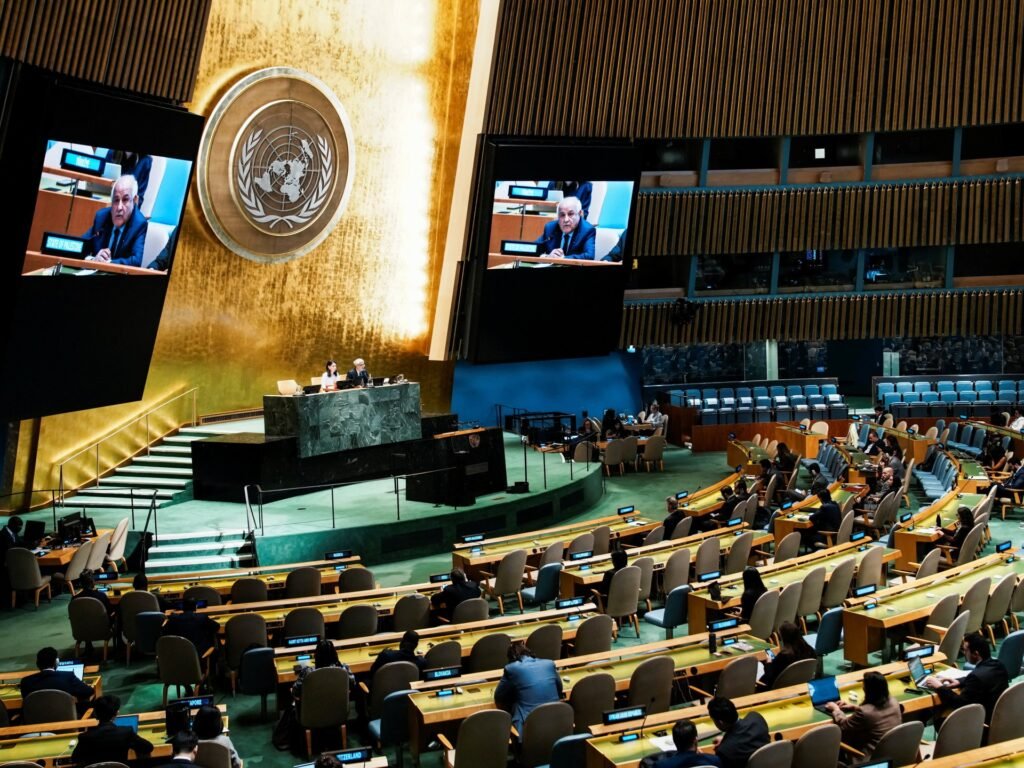Despite 157 UN member states recognising a Palestine state, it remains under Israeli control. Here’s why.
A wave of recognition from Western countries – led by France, the United Kingdom, Australia and Canada – means that 157 countries now recognise a Palestinian state.
The latest countries to recognise Palestine include strong allies of Israel who have tried to frame the recognition as an attempt to keep alive the idea of a two-state solution, which envisions a Palestinian state alongside Israel.
Recommended Stories
list of 4 items
- list 1 of 4French towns fly Palestinian flag despite gov’t ban before recognition
- list 2 of 4France among six more countries to formally recognise Palestinian statehood
- list 3 of 4Joy to worry: Palestinians react to the recognition of their statehood
- list 4 of 4Which are the 150+ countries that have recognised Palestine as of 2025?
end of list
“In the face of the growing horror in the Middle East, we are acting to keep alive the possibility of peace and a two-state solution,” Keir Starmer, the UK prime minister, said in a statement. “That means a safe and secure Israel alongside a viable Palestinian state. At the moment, we have neither.”
While diplomatically the recognition of Palestine is a major step forward, on a practical level, it does little to bring the possibility of statehood any closer.
Israel has only increased settlement construction in the occupied West Bank throughout its war on Gaza and responded to the recognition of Palestine at the United Nations General Assembly this week by doubling down on its commitment to never allow a Palestinian state.
So does recognition bring Palestine any closer to statehood, and what does a territory need to be considered a state? Let’s take a closer look.
What does it take to be a state?
There is no single definition of a state, but international law widely cites the Montevideo Convention of 1933. The UN has previously referenced the Montevideo Convention when discussing Palestinian statehood.
The convention does not require a state to be recognised by others. Instead, it specifies that a territory must have defined borders, a government, the capacity to enter into relations with other states and a permanent population.
So could Palestine be a state?
While many of the states that recognise Palestine are vague about its exact borders, most envisage lines close to those before Israel’s 1967 war, including Gaza, the West Bank and East Jerusalem.
Israel has occupied Palestinian territory since 1967 despite that being illegal under international law.
The Oslo Accords between Israel and the Palestinians in the 1990s were supposed to start the process leading to the formation of a Palestinian state and created the Palestinian Authority (PA).
The PA engages in foreign relations, maintaining diplomatic ties with numerous countries and operating various diplomatic missions, including embassies, representative offices and delegations
And in terms of its permanent population, millions of Palestinians live in the West Bank, Gaza and East Jerusalem and have done so for generations despite decades of Israeli policies.
However, the degree to which Israel allows the PA to operate as an independent state is disputed. While the PA exercises some governmental functions, international bodies have questioned its full capacity to govern.
For example, the UN Secretariat in 2011 and the International Criminal Court in 2020 noted that despite meeting all the other conditions for statehood set out in the Montevideo Convention, Israel’s control over the PA’s borders, movement within the territory – where Israel maintains a heavy security presence – resources and security operations undermine the PA’s ability to govern.
So, why isn’t Palestine a state?
Because international law can go only so far.
Since establishing Kfar Etzion, its first settlement in the West Bank after the 1967 war, Israel has created more than 160 settlements across the Palestinian territory and occupied East Jerusalem, housing about 700,000 Israelis. These settlements are illegal under international law.
During its war on Gaza, settlement construction has surged. Israel’s latest plan to build about 3,400 new homes would bisect the West Bank while linking thousands of existing settlements by roads for Israeli use only, making any future Palestinian state almost impossible.
In addition, Israel has constructed industrial developments, such as the Barkan Industrial Park, in occupied territory.
Israeli and international firms are encouraged to locate themselves in the industrial parks, receiving government subsidies, low rents, favourable tax rates and access to cheap Palestinian labour in return for supporting the settlements’ economies.
Among them, according to Amnesty International, are international companies such as Airbnb, Expedia and JCB.
![Israeli far-right Finance Minister Bezalel Smotrich holds a map of an area near the settlement of Maale Adumim, a land corridor known as E1, outside Jerusalem in the occupied West Bank, on August 14, 2025, after a press conference at the site. [Menahem Kahana/AFP]](https://gulfnewsweek.com/wp-content/uploads/2025/09/Does-international-recognition-mean-Palestine-is-going-to-be-a.jpg)
How likely is Israel to give up its settlements?
Very unlikely.
Many settlers and their supporters in the Israeli government see their presence in Palestinian territory as ordained by Jewish scriptures.
According to them, in addition to settling Gaza, they hold a “divine mandate” to reclaim the West Bank, or Judea and Samaria as they refer to it, and even to potentially expand Israel’s frontiers to form “Greater Israel”, a territory that includes parts of Lebanon, Syria, Jordan and Egypt.
Settlers themselves are being increasingly aggressive in seizing Palestinian land, facing little pushback from the Israeli state, and their agenda is openly supported by Israeli Prime Minister Benjamin Netanyahu’s Likud party.
Many settler leaders are in government, including Finance Minister Bezalel Smotrich and National Security Minister Itamar Ben-Gvir.

But what about international law?
Israel, with the absolute backing of the United States, has shown little regard for international law from the first ejection of 750,000 Palestinians in 1948 to the present.
In fact, rather than recognise a Palestinian state as others have done, the Israeli Knesset voted in July in defiance of international law and approved a motion to annex the West Bank, which constitutes much of one.
On Sunday in response to the moves by the UK, France, Australia and other countries, Netanyahu was clear: “It will not happen. There will be no Palestinian state west of the Jordan [River],” he pledged.
